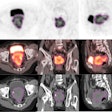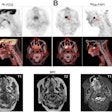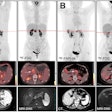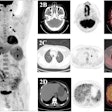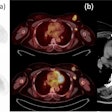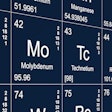Patients undergoing external-beam radiation therapy (EBRT) for localized prostate cancer may be at an increased risk for secondary malignancies 10 or more years after initial treatment. French-Canadian men who received EBRT between 1983 and 2004 were found to have a higher prevalence of bladder, rectal, and lung cancers compared to those who had a radical prostatectomy (RP).
However, in absolute terms, the estimated risk of developing a radiation-associated secondary malignancy was low, according to Dr. Naeem Bhojani, a second-year resident from the University of Montreal who presented the study at the annual meeting of the American Urological Association in Orlando last week.
The retrospective study evaluated administrative data from the Quebec Health Plan Database of 6,196 prostate cancer patients who had RP and 4,137 who had EBRT. Any French-Canadian prostate cancer patient in the database who also received adjuvant hormonal therapy was excluded.
The objective of the study was to determine if a specific ethnic group would generate comparable results to recent previously published studies evaluating different databases. By focusing on French-Canadians, the authors wanted to determine if a different genetic makeup, different nutritional patterns, and different environmental issues would yield different results.
The patients who received RP ranged from 55 to 89 years of age, with an average age of 64. EBRT patients were 55 to 95 years of age, with an average age of 71.5. An average age difference was expected because older patients typically have more comorbidities and are offered EBRT before surgery is suggested, Bhojani said.
IDC-9 treatment codes were used to identify secondary malignancies for cystectomy and colon, lung, and rectal cancers. After multivariate analysis was performed with adjustments made for age, baseline comorbidities, and year of treatment, EBRT predisposed patients to a 300% increase for cystectomy for bladder cancer, a 170% higher rate for rectal cancer, and a 180% increase in lung-cancer resections. Because the smoking histories of patients were not available, the authors were not able to differentiate the statistics between smokers and nonsmokers.
These findings were comparable to those reported in Cancer in 2006 by Dr. Kihyuck Moon and colleagues from the University of Virginia Health Sciences Center, located in Charlottesville. Using data from the U.S. National Cancer Institute's Surveillance, Epidemiology, and End Results (SEER) registry of men diagnosed with prostate cancer from 1973 through 1999, the study determined that patients receiving EBRT had a 163% increase in odds of developing bladder cancer and a 160% increase in odds of developing rectal cancer. Lung cancer odds increased by 124% and transverse colon odds by 185%. The SEER registry represents approximately 14% of the U.S. population.
A 2007 study in the Journal of Urology by Dr. Stephen Boorjian and fellow urologists of New York-Presbyterian Hospital and Weill Cornell Medical Center, utilizing data from the CaPSURE disease registry between 1989 and 2003, determined that patients treated with RP were approximately half as likely to have posttreatment bladder cancer as patients who underwent EBRT.
In an interview with AuntMinnie.com, Bhojani pointed out that the improvements in EBRT made in the past five years, with more radiation concentrated in a much more confined area, may yield very different results if the same studies are performed a decade from now.
"It is important to put this study in context," Bhojani said. "The risk for prostate cancer patients to have secondary cancer malignancies is very, very low."
By Cynthia Keen
AuntMinnie.com contributing writer
May 28, 2008
Related Reading
Ultrasound contrast boosts prostate biopsy yield, May 22, 2008
CT planning eliminates need for urethrography in prostate, May 12, 2008
Trial results bolster hormone therapy plus radiation for prostate cancer, March 31, 2008
Disease-free survival, mortality uphold novel radiotherapies for prostate cancer, February 14, 2008
Early salvage radiotherapy improves survival if PSA rises after surgery, February 14, 2008
Copyright © 2008 AuntMinnie.com












